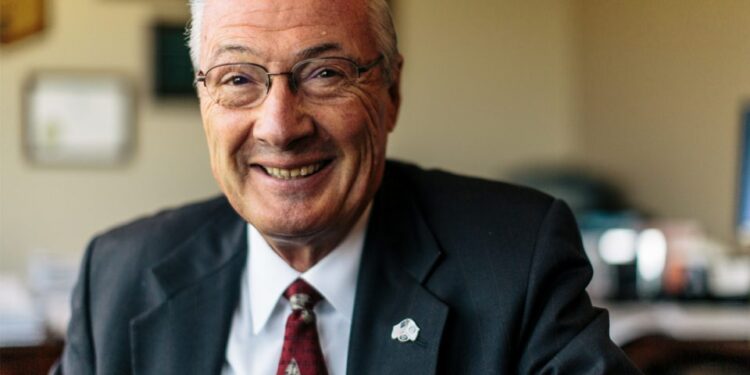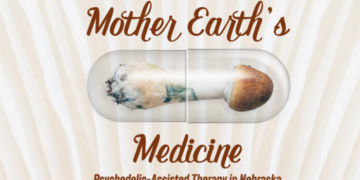Hal Daub could probably fill several pages of a resume with his titles and life experiences: musician, soldier, attorney, businessman, congressman, Omaha mayor, regent, elder statesman. But the title Distinguished Eagle Scout visibly elicits Daub’s greatest reverence and pride.
The Distinguished Eagle Scout Award represents the highest honor the Boy Scouts of America can give to an adult. The criteria for the award set the bar high and few men make the grade.
“You have to live at least 25 years after you make Eagle Scout. Mind you, less than 4 percent of all boys who start scouting make it to Eagle Scout,” explains Daub, 76, as he proudly shows the framed medal hanging in his law office at Husch Blackwell. “You have to have been community-oriented as well as made a significant contribution to your profession.”
The Mid-America Council has extended the DESA to 12 men, including Daub, former U.S. Senator Ben Nelson, former Creighton basketball coach Dana Altman, and the late Rev. John Schlegel, former president of Creighton University.
Another framed memory of Daub’s scouting days sits on his desk. A 1955 color photo taken of him the day he became an Eagle Scout at age 14 shows his extensive collection of merit badges. “I had about 21 or so merit badges. Now, they have about 150!” he laughs.
The path to Eagle Scout started when he entered second grade at Mount View Elementary School on 52nd Street near Fort Street. His grandmother suggested he join Cub Scouts. From that moment, Daub took to scouting the way Husker Nation takes to Scott Frost: all in.
“I loved it,” Daub says quietly, reflecting on all the friends he made, including some who remain his close friends to this day. “I loved the camaraderie and teamwork, doing things together. That appealed to me.”
The life skills he learned as he progressed through scouting—problem solving as a group, leadership, responsibility, a sense of community—all factored in his decision to become involved in Republican politics after he obtained a law degree at the University of Nebraska-Lincoln in 1966 and finished his tour of duty as a captain in the Army two years later.
But for young Hal Daub of Pack 13, Den 13, who lived on an old farmstead near 60th Street and Ames Avenue with his parents and younger brother, Russ, lofty ideals didn’t stoke the fires of love for scouting. Campouts did.
“I loved to go out on a cold Saturday and Sunday, build a fire, and go through whatever the adults had planned for us to learn on that particular campout. We cooked breakfast, lunch, and dinner over a campfire,” recalls Daub. “I learned about nature and conservation. I earned my astronomy merit badge by learning the constellations during one camping trip.” The young scout excelled at outdoor activities, also earning merit badges in hiking, swimming, cooking, and lifesaving.
Daub’s only story of bad behavior occurred at Camp Cedars in Cedar Bluffs, Nebraska, outside Fremont. A group of older scouts cajoled the 12-year-old Daub to light up a cigarette. Sure enough, his scoutmaster caught him puffing away, a definite no-no. Daub didn’t smoke again until college and quit in 1981. But he’s never forgotten his earlier embarrassment.
“When you talk to former Boy Scouts, that’s their memory—camping,” says Lisa Russell, communications director of the Mid-America Council of the Boy Scouts, an organization that covers 58 counties in Iowa and Nebraska. “Camping is still a big aspect of scouting.”
Russell points to five years of steady growth, making the Mid-America Council one of the most successful in the country. Scout membership boasts almost 21,000 boys and over 7,000 volunteer leaders. Girls can now join the ranks of Boy Scouts, a 2018 change in policy embraced and encouraged by Daub.
“Scouting will take a young boy or girl and stimulate their interest in doing well and performing well, which can apply to academics, extracurricular, and community activities,” he says.
Daub still attends Eagle Scout Award ceremonies throughout the area, often as a guest speaker. He sits on the Mid-America Council board of directors and, according to Russell, can still open doors.
“He’s great at opening dialog with superintendents and people of that caliber to help us promote or get a pack going,” she says.
Why does Daub still devote so much time to scouting? Because it changed his life.
“If I had to rank the things that made the most significant contribution to any success I may have had,” says Daub, “I’d put scouting first.”
Visit mac-bsa.org for more information.
This article was printed in the 2019 Summer Camp Edition of Family Guide.













